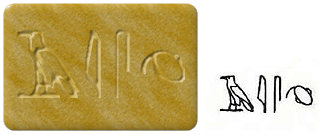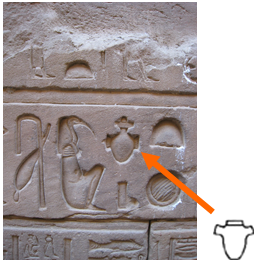If the historical record is correct then the ancient Egyptians threw away their brains.
I mean, when they preserved people’s bodies using the mummification process they did not preserve the brains with the other body parts, which included the heart, the liver, the lungs, the stomach, and the intestines. The ancient Egyptians preserved all those parts for the afterlife. And they preserved the skeleton and muscles.
But, they did not preserve the brains. They threw them away.
I found that fascinating.
So, I did a little research.
Here are the Egyptian hieroglyphs for the brain and the heart:
 |
 |
| Brain |
Heart |
NOTE: the above hieroglyph for ‘brain’ is what you will find if you search the Internet. Since drafting this Thought Post I became even more interested in hieroglyphs and I purchased Jean-Francois Dumon’s ‘Aaou Hieroglyphic Dictionary’. That dictionary indicates the above hieroglyph does not represent ‘brain’; it represents ‘viscera’…which, of course, means other organs [not the brain].
Jean-Francois Dumon presents the following hieroglyph for ‘brain’:
D36-G17-G17-F51 [I am trying to contact Jean-Francois Dumon to sort this out]
Here is an excerpt describing ancient Egyptian thinking about the
heart…
“Heart (ieb)
Appearance: Those used to the valentine-related heart of Western Culture may be surprised at the Egyptian concept of the heart. Theirs looks more like a vase with handles, and indeed many vases and jars were shaped like the hieroglyph in question. The heart of Egyptian iconography is a fairly faithful representation of a section of the heart of a sheep. The "handles" correspond with the connection of the veins and arteries to the organ.
Meaning: The Egyptians early in their history realized the connection of the heart to the pulse. An ancient Egyptian medical treatise of the heart says that it "speaks in the vessels of all the members." It is not surprising then that they believed that the heart held the mind and soul of the individual. Another Egyptian author stated emphatically that "the actions of the arms, the movement of the legs, the motion of every other member is done according to the orders of the heart that has conceived them." It was sometimes said of the dead that their hearts had "departed" because it was believed that the heart was the center a man's life force.”
The above excerpt is representative of the way experts describe the ancient Egyptian view: the heart held the mind and soul of the individual...and the heart governed the body.
Now, ‘Western’ thinking – thinking heavily flavoured with science - has a different view.
I hope I do not do an injustice to that ‘Western’ thinking when I describe [my understanding of] it this way:
- The brain governs the body [although there is at least a partial acceptance that spinal neural systems can influence the body, independent of the brain]
- The brain may contain the mind…probably, if ‘the mind’ exists then the brain does contain the mind…however, there is no scientific evidence to confirm the mind exists whether as a thing independent of the brain or as a subset of the brain
- The heart is a pump, which pumps blood…it governs circulation of blood…that’s it
Considering all that and more…
Is it reasonable to conclude the ancient Egyptians, when they preserved their hearts and threw away their brains, were primitive and ignorant?
Is it reasonable to conclude the ancient Egyptians were 100% wrong?
Footnote:
Related to this…the folks who follow my Thought Posts know ‘I Wonder’ about a lot of things. This ancient Egyptian heart and brain topic has me wondering. I have read ancient Greeks, pre-Socratic Greeks, did not take credit for most or maybe even all of their thoughts. As a rule they believed the gods caused them to think what they thought and feel what they felt. As examples, if while on the battlefield they became fearful they blamed it on a god and if they prevailed over the enemy they credited a god. [Refer to Homer’s ‘Iliad’] So, it is easy [but not necessarily accurate] to conclude the ancient Greeks heard voices in their heads...similar to the voices normal people now hear in our heads [or perhaps just in front of our faces]. I mean that voice that talks to us all the time, helping us sort out things and decide what to do. Assuming the ancient Greeks heard voices as we now do, they heard [essentially] their own voice but concluded the gods were using that voice to speak to them.
Today, we tend to believe the voice belongs to us rather than a God or the gods.
I wonder:
- Did the ancient Egyptians ‘hear’ voices?
- If so then were those voices in or near their hearts rather than their heads?